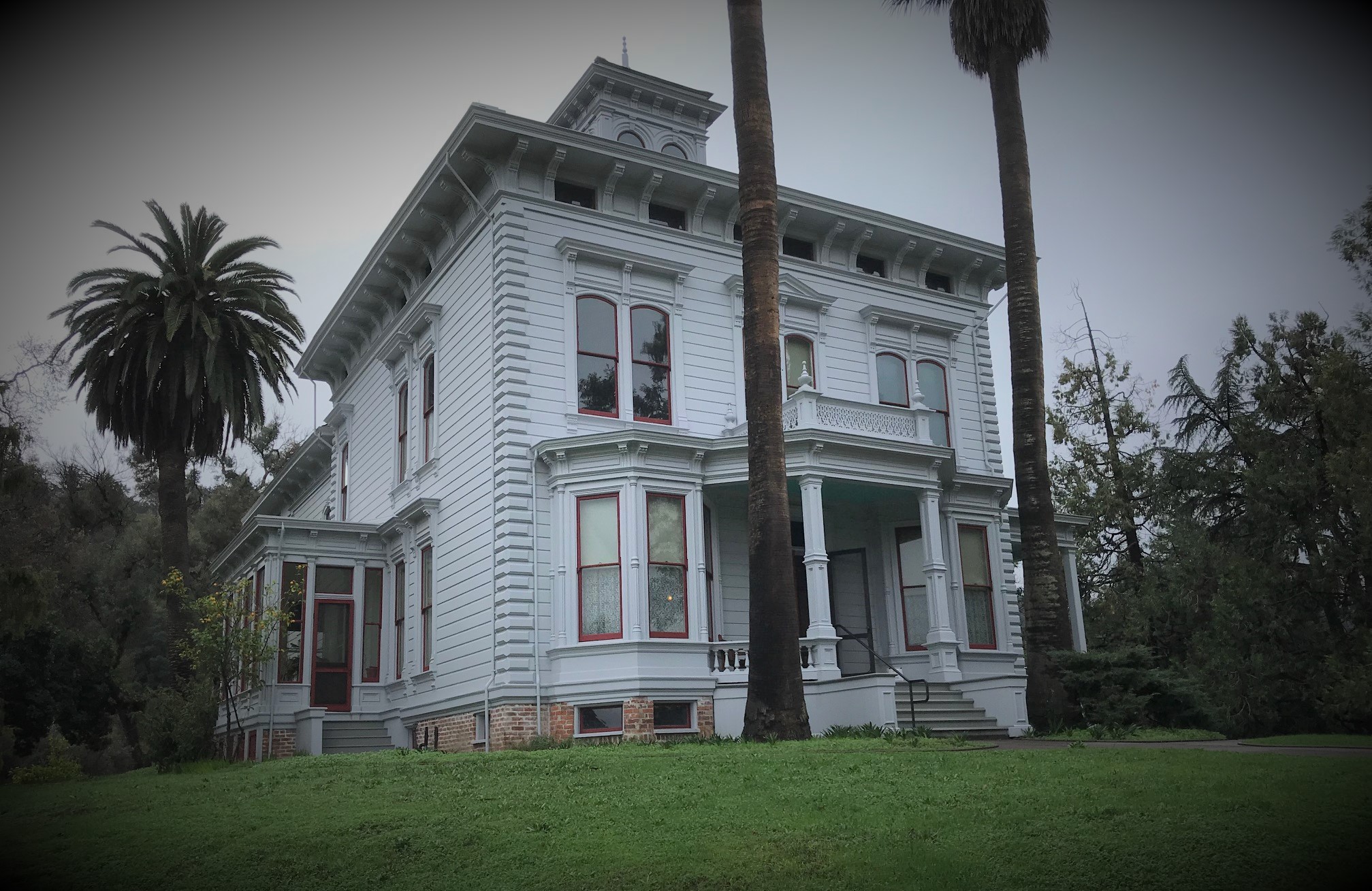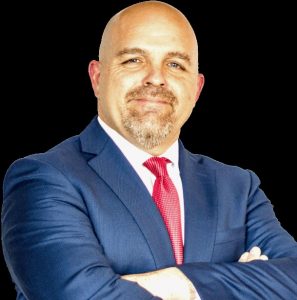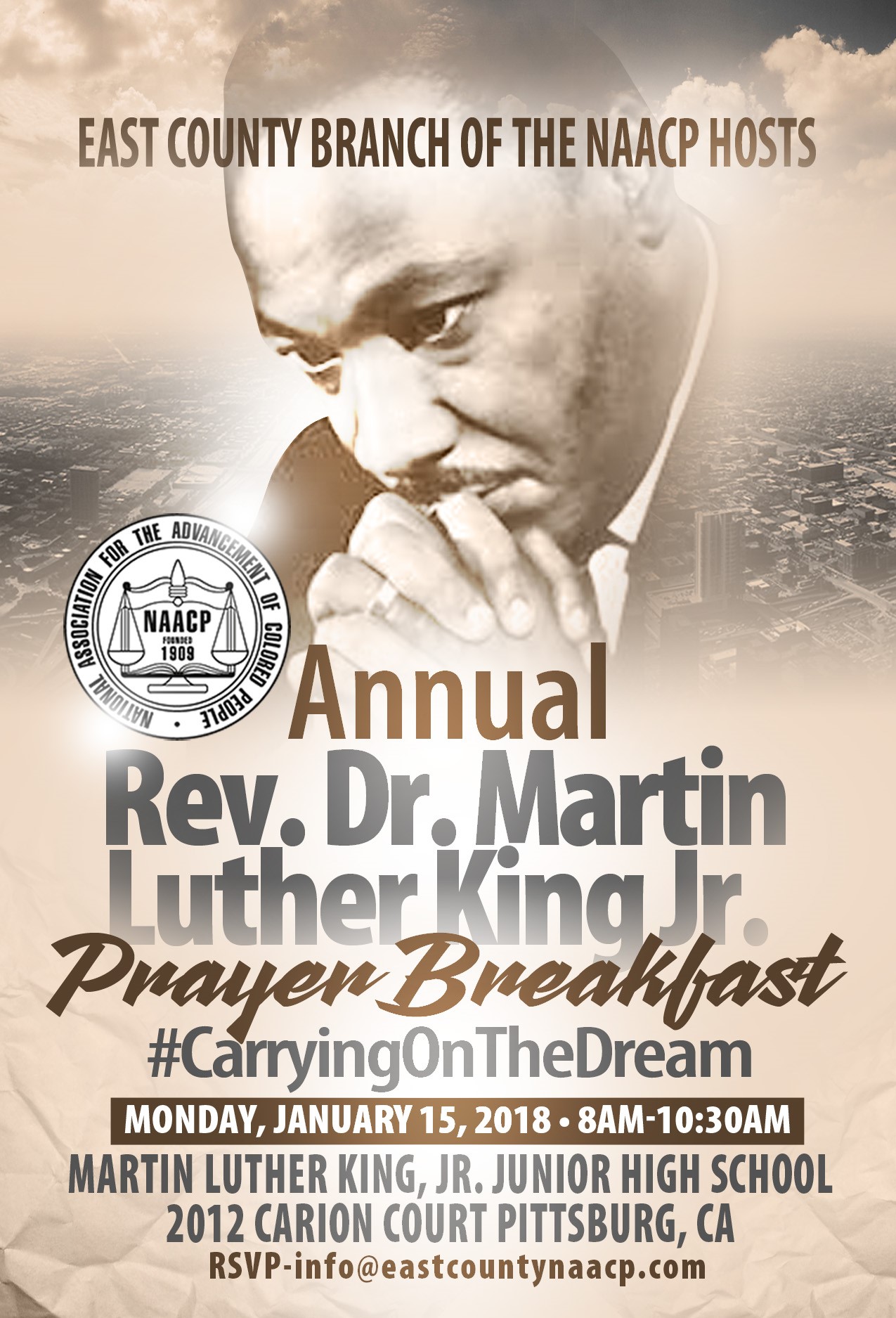In celebration of Black History Month, the Southern Café is blending a night of historical Negro spirituals inspired by singer Paul Robeson by America’s Got Talent Finalist Lawrence Beamen. Lyrical hip hop duo The Lion’s Den will also perform their latest hits.
This memorable night will take place on Friday, February 2, 2018. General admission tickets are $25, and doors open at 5:30pm. For $40 you will receive priority VIP seating followed by a Meet & Greet with the artist at 7:00pm; Entertainment begins at 8:00pm. A portion of the proceeds will benefit His Presence Christian Worship Center’s Youth Department.
For general information contact the Southern Cafe at (925) 754-1172. To purchase tickets visit: www.lawrence-beamen.eventbrite.com.
The Southern Café is located at 400 G Street in Antioch, California’s historic, downtown Rivertown.
Presented by:
Read More

The damaged motorcycle of a CHP Officer who was injured in a crash on eastbound Hwy 4, Monday night, Jan. 15, 2018. Screenshots from NBC Bay Area News report.
According to the CHP – Contra Costa Facebook page, “This evening at about 6:15 pm, one of our CHP Officers was involved in a traffic collision at SR-4 eastbound and Port Chicago Highway (in Concord). He suffered major injuries, non-life threatening, and was transported to a local hospital. The scene is still active for the investigation. We have no further details at this time, but we will advise when we do. Thank you.”
Further reports on NBC Bay Area TV Channel 3 News and ABC7 News he was a motorcycle officer, and an SUV flipped an landed on the officer including a broken leg. It set off a chain reaction including at least eight cars and three separate crashes. It backed up traffic on Highway 4 for miles.
Read MoreHello Friends and Supporters of Choice in Aging!
Join us for our biggest event of the year as we tie our bibs and crack some fresh crab at our 43rd Annual Crab Feed. This fundraising event helps to support our Alzheimer’s and Adult Day Health Care programs at our Mt. Diablo Center in Pleasant Hill.
WHEN: Saturday, February 10th 5:30 PM Doors Open/Cocktails & Live Music 7:00 PM Dinner
WHERE: Pleasant Hill Senior Center 233 Gregory Lane, Pleasant Hill
TICKETS: $65/Ticket Starting at $1,000 for a VIP (Sponsored) Table for 8 You can find the mail-in ticket form here and the sponsorship form here.
Besides the freshly caught and cracked crab and delicious sides, you can expect to enjoy our:
• Live Auction – Packed with luxurious vacations, dinner at the fire house, and more items that will make you want to lift your paddle!
• Silent Auction – Tons of awesome items to bid on! The chances of winning look good for you!
• Cake Auction – The chocolate behemoth Motherlode Cake will surely be making an appearance, along with other delicious cakes and cupcakes.
• Raffle – This year, our entire raffle will be “teacup” style and is a great way to play the odds in your favor.
• Professionally Staffed Bar – Beer on tap, glasses of wine, and mixed drinks all to wet your whistle.
TIP: Pre-purchase your raffle and drink tickets when you purchase your event ticket to make check-in at the event faster!
Feel free to buy tickets, a table, distribute this information, donate, or volunteer – it’s up to you how you want to support Choice in Aging’s mission to promote dignity and independence of people with disabilities and special needs.
We’d love to see you there. Won’t you join us?!
For sponsorship information, please contact Peggy Dillon at pdillon@choiceinaging.org or (925)682-6330 x141
Read MoreCouples can get married at the historic John Muir House by Clerk-Recorder officiants
Get hitched in style this year! The Contra Costa County Clerk-Recorder office is offering a special venue for couples who wish to exchange wedding vows at a special location on Valentine’s Day.
The Clerk-Recorder Division, in partnership with the National Park Service, will host weddings at the historic John Muir House from 10:20 am to 3:20 pm on February 14th. There are 16 appointments available for this “Destination Wedding” opportunity.
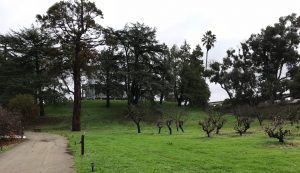 “We are excited to partner with the National Park Service and the staff of the John Muir National Historic Site to offer couples the option of being married at this historic location on Valentine’s Day,” Clerk-Recorder Joe Canciamilla said. “It is with a great deal of local pride that we can highlight the history of our region and of Martinez while offering this memorable option for couples’ special day.”
“We are excited to partner with the National Park Service and the staff of the John Muir National Historic Site to offer couples the option of being married at this historic location on Valentine’s Day,” Clerk-Recorder Joe Canciamilla said. “It is with a great deal of local pride that we can highlight the history of our region and of Martinez while offering this memorable option for couples’ special day.”
“We think it’s great that the local community can use the grounds for a really special day,” said Jim MacDonald, Supervisory Park Ranger at the John Muir National Historic Site.
MacDonald shares a quote from Louisa Strentzel Muir, John Muir’s wife, that he says is applicable to what weddings represent.
“Now I know that neither time nor space can ever separate us, and that wherever you be, here or there, I am with you truly.”
Weddings will be held inside one of the well-decorated rooms of the Italianate Victorian-style home, which was built in 1882. The room features an elegant chandelier and grand piano, detailed architecture and a stunning backdrop for the ceremony with an archway in front of a window overlooking the property.
Couples interested in a ceremony at the John Muir House should call 925-335-7908.
Couples can also make appointments to have their Valentine’s Day wedding ceremony at the Contra Costa Clerk-Recorder Office, located at 555 Escobar Street in Martinez. The office features two beautifully appointed ceremony rooms adorned with handcrafted stained glass windows. Appointment times are from 8:30 am to 4:30 pm. Walk-in couples are welcome and will be accommodated based on availability of ceremony rooms. Appointments are recommended, as Valentine’s Day is one of the busiest days of the year for civil ceremonies.
Those looking to book a ceremony at Clerk-Recorder’s office can do so online at www.contracostacore.us.
A civil marriage ceremony is $60. Couples can obtain a public marriage license for $86 or a confidential license for $90.
To save time, marriage license applications are available for completion online at www.contracostacore.us prior to visiting the office and may also be purchased before the ceremony date.
For more information, contact Joseph Barton, Clerk-Recorder Services Supervisor at (925) 335-7928.
Read More
2018 Subaru Outback. Photo by evox images
Meals on Wheels and Senior Outreach Services (MOWSOS) is proud to announce that it will receive the donation of a 2018 Subaru Outback as part of a partnership between Meals on Wheels America and Subaru of America, Inc. in celebration of the ’50 CARS FOR 50 YEARS’ campaign.
“We are both thrilled & honored to announce that MOWSOS is one of 50 national recipients of a 2018 Subaru Outback for this campaign,” says Elaine Clark, Chief Executive Officer for MOWSOS. “We are so thankful to Meals on Wheels America and Subaru for recognizing the work we are doing to combat isolation, and for giving us a vehicle to use for wellness visits to check on frail, home-bound seniors.”
On Thursday, January 18, MOWSOS will receive the car during a celebration event held at Diablo Subaru of Walnut Creek, 2646 N. Main St. in Walnut Creek. The event will take place from 5:30pm until 7:00pm. Complimentary on-site valet parking and refreshments will be provided.
“Diablo Subaru of Walnut Creek is proud to be selected by Subaru of America to deliver a 2018 Subaru Outback to Meals on Wheels and Senior Outreach Services. This is a great opportunity for us to be part of an event that will benefit a superb organization like MOWSOS, enabling them to provide even more comprehensive services, which benefits our entire community,” says Tom Baxley, General Manager for Diablo Subaru of Walnut Creek.
Meals on Wheels and Senior Outreach Services is a full-service nonprofit organization dedicated since 1968 to helping seniors live independently and with dignity. Based in Walnut Creek, the agency serves older adults all across Contra Costa County. More information can be found at www.mowsos.org.
Diablo Subaru of Walnut Creek has been serving the Walnut Creek community for over forty years, and is one of Northern California’s largest volume Subaru retailers. Six months ago, construction was completed on a brand new, state-of-the-art facility, enabling them to better serve their sales and service customers. More information can be found at www.diablosubaru.com.
Meals on Wheels America (MOWA) is the oldest and largest national organization supporting the more than 5,000 community-based senior nutrition programs across the country that are dedicated to addressing senior hunger and isolation. This network exists in virtually every community in America and, along with more than two million volunteers, delivers the nutritious meals, friendly visits and safety checks that enable America’s seniors to live nourished lives with independence and dignity. By providing funding, leadership, education and advocacy support, Meals on Wheels America empowers its local member programs to strengthen their communities, one senior at a time. For more information, or to find a Meals on Wheels provider near you, visit www.mealsonwheelsamerica.org.
Subaru of America, Inc. (SOA) is a wholly owned subsidiary of Subaru Corporation of Japan. Headquartered at a zero-landfill office in Cherry Hill, N.J., the company markets and distributes Subaru vehicles, parts and accessories through a network of more than 620 retailers across the United States. All Subaru products are manufactured in zero-landfill production plants and Subaru of Indiana Automotive, Inc. is the only U.S. automobile production plant to be designated a backyard wildlife habitat by the National Wildlife Federation. SOA is guided by the Subaru Love Promise, which is the company’s vision to show love and respect to everyone, and to support its communities and customers nationwide. Over the past 20 years, SOA has donated more than $120 million to causes the Subaru family cares about, and its employees have logged more than 40,000 volunteer hours. As a company, Subaru believes it is important to do its part in making a positive impact in the world because it is the right thing to do. For additional information visit media.subaru.com.
Read More
Today, Friday, January 12, 2018, Patrick Vanier, Supervising Prosecutor in Santa Clara County, and a candidate for Contra Costa County District Attorney issued the following statement:
“When I announced my candidacy for District Attorney last spring, I made it clear that my candidacy was not about me, but about bringing real reform to the office of District Attorney and instituting best practices to bring Contra Costa County’s criminal justice system into the 21st Century. I was the first to declare my candidacy to challenge former DA Mark Peterson and I am proud to have started the dialogue for change.
A little more than a month later, Mark Peterson resigned from office. Upon his resignation, the County initiated an appointment process to fill the vacancy. I was honored to be selected by the Contra Costa County Board of Supervisors as a finalist in that process.
During the appointment process in the summer and fall, I again made it clear that if a person was appointed who can bring progressive leadership to the office of District Attorney and will modernize and standardize how cases are prosecuted, I may not seek election.
Ultimately, the Board of Supervisors voted to appoint retired Judge Diana Becton to be District Attorney. (See related article) Although I was disappointed in not receiving the appointment, I respected the Supervisors’ decision as they recognized the importance of selecting a candidate from outside the dysfunction of the current office. While I was in this race to win, as I felt that I possess the skills this County needs, I also realize the importance of ensuring that change does indeed occur.
Over the past several months I have been following the developments within the Contra Costa District Attorney’s Office under District Attorney Diana Becton. I believe she has undertaken a course of action to run the department in an honest and ethical manner and will utilize the latest technologies, data analytics, and community prosecution models to prevent crime and prosecute cases. I want this County to be focused on ensuring that change continues.
For these reasons, I have decided to withdraw from the race for Contra Costa County District Attorney and fully support and endorse Diana Becton.
I want to thank my supporters for their unflagging support and encouragement and I will be urging them to support Diana Becton.”
On his campaign website, Vanier said he offered “progressive leadership” to the people of Contra Costa County. With him out of the race the remaining candidates, currently are the appointed incumbent, Interim Contra Costa DA Becton and Contra Costa Senior Deputy District Attorney Paul Graves, who entered the race last spring to take on Peterson, prior to his resignation and has the support of most law enforcement organizations in the county. If no other candidates enter the race the winner of the Primary Election in June will be elected. According to the County Elections Office website, the filing period for the election begins February 12 and ends March 9.
Allen Payton contributed to this report.
Read MoreGlover highlights accomplishments this past year as Board Chair for possibly, the final time
By Daniel Borsuk
Water, air quality, transportation and the new Pleasant Hill public library will be top 2018 hot button issues of newly elected Contra Costa County Board of Supervisors Chair Karen Mitchoff. District 1 Supervisor John Gioia of Richmond was elected Vice Chair for 2018, in the annual rotation of the board’s leadership.
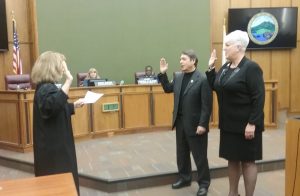
Contra Costa Superior Court Judge Jill Gannin gives the oath of office to county new Board of Supervisors Vice Chair John Gioia and to Chair Karen Mitchoff on Tuesday, Jan. 11, 2018. Photo by Daniel Borsuk
A supervisor from Pleasant Hill and representing District 4 on the board, Mitchoff said after being sworn into office by Contra Costa County Superior Court Judge Jill Fannin on Tuesday, “The new year ushers in a rush of ideas of reflection and projection” as she aims to apply the four key issues during her administration in 2018.
“While I doubt the $3 bridge toll increase will pass, I believe the measure should be placed on the ballot so that the people have the opportunity to vote on it,” she said, who replaces District 5 Supervisor Federal Glover of Pittsburg as chairperson.
Concerning water quality issues, Mitchoff said Gov. Jerry Brown’s $16 billion Twin Tunnels project is “going nowhere.” The supervisor added, “This project does not have the funding.”
The supervisor said state and local governments need to come up with more sensible, less costly and more environmentally compatible water projects similar to the proposed Los Vaqueros Reservoir expansion project near Brentwood.
“I’m happy to say it’s been a great year,” said outgoing board chairman Federal Glover of Pittsburg. “We did everything from A to Z.”
One of the county’s major accomplishments has been the continual financial stability, Glover said. “We’ve been financially stable the last seven years,” he said. The county has maintained a Standard & Poors AAA rating an Aa3 rating from Moody’s Investor Services.
Glover was also proud of the work done on the Northern Waterfront Planning Area. “The Northern Waterfront initiative is becoming a reality with new business opportunities,” the supervisor from Pittsburg said.
“It is predicted by the year 2030 some 18,000 new jobs will be created along the waterfront,” Glover continued.
The Northern Waterfront is already being planned to be used for a self-driving car testing site and as a potential public university campus site.
In 2018, the county will break ground to construct a $60 million county administration building to be constructed nearby the existing administration building in downtown Martinez, the county seat since 1850. An additional $40 million will be allocated to build a modern Emergency Operations Center at Glacier Drive in Martinez. The county closed on $100.3 million in lease revenue bonds to construct the new administration building and Emergency Operations Center. The bonds were sold for a 15-year term at an interest rate of 2.387 percent.
During 2017, the board of supervisors were responsible for 35 major achievements, said Glover. Some of those achievements were:
- The appointment of interim District Attorney Diana Becton, who replaced former District Attorney Mark Peterson who was found guilty for misuse of campaign funds.
- Creation of the Stand Together CoCo, a rapid response and community education project to support safety and justice for immigrant families in Contra Costa.
- Ended the year at 83 percent Live Release Rate for all animals at county run Animal Services facilities. The live release rate for dogs and cats was 87 percent, up from 67.17 percent in 2014.
- Contra Costa County Fire Protection District ambulance service performance is now required to arrive 90 percent of the time within 11 minutes and 45 seconds in all zones except Richmond, where they are required to arrive within 10 minutes and 90 percent of the time. District performance has consistently been in the 95 percent range and at time as high 98 percent. This means ambulance response times are much quicker.
- Approved the mixed use Saranap Village Project near Walnut Creek. The project will provide 198 housing units and a significant amount of commercial space.
During her initial year in office, District 3 Supervisor Diane Burgis of Brentwood listed a number of accomplishments in 2017 including seeing the opening of a Veterans services office in Brentwood and the start of Tri Delta bus service to the Martinez Veterans Medical Center.
Burgis said she looks forward to a number of accomplishments in 2018 that will benefit East County constituents including completion of work on the Morgan Territory, Byron Highway and Balfour Highway projects and the startup of EBART train service.
Read MoreDiscover Diablo is Save Mount Diablo’s free public hike series program, offering an annual schedule of guided interpretive family walks, hikes and property tours open to any and all trail blazers looking to get out in nature. Generously sponsored by the Shell Martinez Refinery for a second year, the 2018 Discover Diablo Free Public Hike Series will begin in mid-January.
Hosted by Save Mount Diablo, the Discover Diablo program, now in its second year, continues to build awareness of local land conservation efforts and to convey the importance of protecting open space for habitat and recreation. Through this initiative, Save Mount Diablo intends to reach new audiences, build our membership base of adventurers, explorers and outdoor enthusiasts, spark a passion for the Diablo Range, and engender community conservation by deepening connections to the land and nature.
“We are pleased to sponsor this opportunity for people to explore and discover the beauty of Mount Diablo, a wonderful natural resource in our own backyard, with experienced guides,” said Ann Notarangelo, External Relations Manager for the Shell Martinez Refinery. “We hope that people will enjoy learning more about the diverse habitats and the striking vistas while spending time outside with their families and friends.”
We invite you to join us in exploring the Bay Area’s beautiful wild lands and open spaces. Discover Diablo offers two events per month for the entire year – either taking place on a Save Mount Diablo property or hosted on a collaborating agency’s land. Save Mount Diablo’s Family Walks are for hikers of all skill levels and will take place on other portions of open space on and around the mountain. Save Mount Diablo’s Property Tours will illustrate the importance of preserving wildlife habitat, building corridors between existing parks, and of course, all the beauty that the Diablo Range has to offer. We hope that with two events per month in various locations, there will be something for everyone to enjoy and learn from.
To honor Save Mount Diablo’s mission, we aim to display both our current property holdings as well as those we have helped protect over the years. Hosting monthly hikes is an effective way to engage and grow communities invested in the sustainability of local open space. SMD properties aren’t usually open to the public, so these are rare opportunities.
To complete the land conservation picture in the Diablo Range and pay homage to collaborating agencies, we also host monthly outings on Mount Diablo State Park, East Bay Regional Park District, and Walnut Creek Open Space Foundation lands. Discover Diablo ties these outings together by offering an annual schedule of free public hikes to explore these diverse lands – with the added bonus of being guided by knowledgeable staff and experienced volunteer hike leaders.
According to Ted Clement, Executive Director of Save Mount Diablo, “It is the goal of the Discover Diablo program to build connections between people, Save Mount Diablo, and the land, helping communities develop a strong sense of place and a deepened appreciation for our collective backyard. Most importantly, we want to cultivate a love of the land in participants – so as to grow the land ethic and stewardship for our precious Mount Diablo area.”
We intend to reach audiences from all over the Bay Area to improve awareness of and advocacy efforts for the Diablo Range. There is something for us all to discover in the nooks and crannies surrounding Mount Diablo. Please join us on the trails to find your own individual inspiration!
RSVP required. See our full schedule of upcoming hikes: http://bit.ly/Discover-Diablo-Hikes-Calendar
Read More Rep. Mark DeSaulnier (D, CA-11) will host a tax-focused town hall meeting in El Cerrito on Saturday, January 13th at 2:00 p.m. This town hall was originally scheduled in December, but was postponed when Republican Leadership changed the voting schedule to rush the tax bill through Congress.
Rep. Mark DeSaulnier (D, CA-11) will host a tax-focused town hall meeting in El Cerrito on Saturday, January 13th at 2:00 p.m. This town hall was originally scheduled in December, but was postponed when Republican Leadership changed the voting schedule to rush the tax bill through Congress.
Since taking office in 2015, the Congressman has hosted 53 town halls and mobile district office hours throughout Contra Costa County. In his first town hall of 2018, DeSaulnier invites residents to participate in a discussion of the new Republican tax law, which was passed by Congressional Republicans and signed into law by President Trump last month. The law increases taxes on more than 5.5 million California families. Bay Area residents who own or are interested in purchasing a home, in one of the most expensive housing markets in the country, are particularly impacted by the law. New home purchasers are subject to limits on the mortgage interest deduction and current homeowners have lost the ability to fully deduct state and local taxes (SALT). It is DeSaulnier’s opinion that “the bill was jammed through Congress with little debate and no Democratic amendments in an effort to deliver a massive tax cut to corporations and the wealthiest 1%.”
During the town hall constituents will be provided with an overview of the legislation and its potential impact on Bay Area residents, and will have an opportunity to ask questions or share comments about the new law.
El Cerrito Town Hall
Saturday, January 13, 2018
2:00 p.m. to 3:30 p.m.
El Cerrito Community Center
7007 Moeser Lane
El Cerrito, CA 94530
Please RSVP by visiting https://desaulnier.house.gov/town-hall-rsvp or calling (925) 933-2660. For more information or to request ADA accommodations, contact Congressman DeSaulnier’s office in either Walnut Creek or Richmond.
Read More









